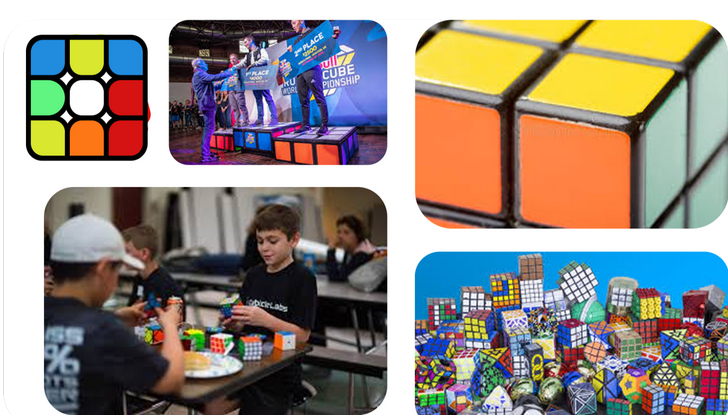𝐈𝐬𝐬𝐮𝐞 #01 | 𝐀 𝐖𝐞𝐞𝐤 𝐈𝐧 𝐂𝐮𝐛𝐢𝐧𝐠
As this is the first issue of "A Week In Cubing", I think I should provide the backstory of the iconic "Rubik's Cube".
The Rubik’s Cube was invented in 1974 by Ernő Rubik, a Hungarian architect and professor of design. Originally conceived as a teaching aid to help students understand three-dimensional geometry, the puzzle was called the "Magic Cube" and consisted of a 3x3x3 mechanism capable of rotating along three axes without falling apart.
The toy was first sold in Hungarian toy shops in 1977. In 1979, it was licensed to the Ideal Toy Corporation, renamed the "Rubik’s Cube," and launched internationally. By 1980–1981, it had become a global phenomenon, selling over 100 million units and becoming a cultural icon.
In response to widespread interest, the first official Rubik’s Cube World Championship was held in Budapest in 1982. The winner, Minh Thai of the United States, solved the cube in 22.95 seconds. However, after the initial boom, interest declined through the late 1980s and 1990s.
The early 2000s saw a resurgence in popularity, thanks to the internet, online tutorials, and communities focused on solving the cube quickly. This led to the development of speedcubing, the competitive practice of solving the cube in the shortest possible time using advanced methods and finger techniques.
The World Cube Association (WCA) was founded in 2004 to standardise competitions and official records. Since then, speedcubing has grown into a global sport with hundreds of official competitions held yearly. Modern records have pushed solve times below 4 seconds, aided by better puzzle design, lubrication, and algorithms.
Today, the Rubik’s Cube is both a timeless puzzle and the foundation of an international competitive community.
To learn more about speedcubing, get beginner tips, and explore curated puzzles and gear, visit cubequests.com.
This week brought some remarkable achievements in the world of cubing, particularly by Keita Hayakawa, who shattered three blind records. These impressive feats include:
- 4x4x4 blindfold single: 1:42.8
- 5x5x5 blindfold single: 4:44.39
- 3x3x3 blindfolded mean: 19.20
These accomplishments are truly astounding, showcasing the incredible progress in speed-solving cubes, especially considering the advancements made within just 15 years. It's inspiring to witness such dedication and skill in the cubing community.
𝐖𝐄𝐄𝐊𝐋𝐘 𝐑𝐄𝐂𝐎𝐑𝐃𝐒
[WR] Lachlan Gibson Clock Average - 2.28
[OcR] [WR6] Alexander Vujcich Megaminx Average - 28.47
[AsR] [WR2] DongSoo Park 7x7x7 Cube Single - 1:36.79
[NR] [WR32] Noah Kraft 3x3x3 Fewest Moves Single - 19
𝐔𝐏𝐂𝐎𝐌𝐈𝐍𝐆 𝐔𝐊 𝐂𝐎𝐌𝐏𝐄𝐓𝐈𝐓𝐈𝐎𝐍𝐒
Coventry Spring 2025, 24-25 May (I will be attending this competition)
Scottish Championship 2025, 30 May- 1 June (I will be attending this competition)
Wellington Skewb Showdown 2025. 30 May – 1 Jun 2025
Budapest Spring 2025 17–18 May 2025
Cyprus Cubing League II 2025 24 May 2025
Cubing Cape Town 2025 24–25 May 2025
𝐂𝐔𝐁𝐈𝐍𝐆 𝐍𝐄𝐖𝐒
Update on Sweden’s bid to host WCA World Championship 2027
Registration of the WCA as a sports organisation
𝐉𝐔𝐒𝐓 𝐅𝐎𝐑 𝐅𝐔𝐍
Cube Myth Busters
Myth: "The more you practice, the faster you get without fail." While practice is key, some speedcubers hit plateaus! Your brain needs rest, too. Remember: mental breaks + targeted practice = faster times.
Cubing Fact or Fiction?
Fact: The 3x3 Rubik's Cube has 43 quintillion possible configurations! But don’t worry, you don’t have to solve them all. Just one is enough for a win at your next comp!
🧠 Cubing Trivia Challenge
Question: Who holds the record for breaking world records in official WCA events the most times?
A) Max Park
B) Feliks Zemdegs
C) Yiheng Wang
D) Lucas Etter
Drop your answers to us in the comments, and we’ll feature the correct answer next time!
Written by Zachary Trimble, founder of Cubequests



